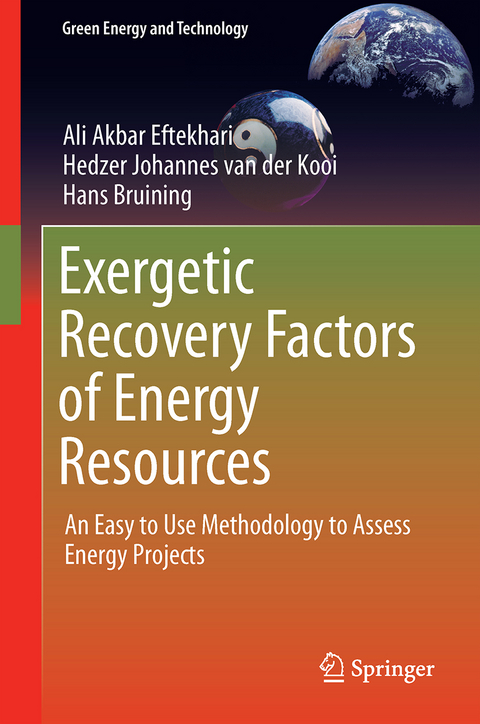
Exergetic Recovery Factors of Energy Resources
An Easy to Use Methodology to Assess Energy Projects
Seiten
2025
|
1st ed. 2024
Springer International Publishing (Verlag)
978-3-319-04231-2 (ISBN)
Springer International Publishing (Verlag)
978-3-319-04231-2 (ISBN)
- Noch nicht erschienen - erscheint am 13.05.2025
- Versandkostenfrei innerhalb Deutschlands
- Auch auf Rechnung
- Verfügbarkeit in der Filiale vor Ort prüfen
- Artikel merken
Taking off from classic thermodynamic principles, this book offers tools for assessing the viability of energy conversion processes. Introduces the exergetic (useful energy) recovery factor, and presents case studies in fossil and non-fossil energy resources.
Using classic thermodynamic principles as the point of departure, this book supplies the tools required to assess the technical viability of energy conversion processes. A new concept, viz. the exergetic (useful energy) recovery factor is introduced that measures net fraction of the extracted useful energy with respect to the initial exergy of the energy resource. With respect to conventional measures, the exergetic recovery factor can be negative, which indicates that more input exergy is required than extracted. A detailed description of the method will be given by applying it both to fossil fuel based energy resources and renewable energy resources. In addition a simplified procedure is given that gives the non-specialist reader the opportunity to judge both conventional and non-conventional energy resources. The case studies discussed comprise the conventional use of fossil fuel (oil gas and coal) the non-conventional use of fossil fuels (shale gas, undergroundcoal gasification) and non-fossil fuel energy resources like geothermal, solar and wind. The book is an ideal guide for those engaged in the transition from fossil-based fuels to renewable and sustainable energy sources and who want to introduce technically viable new energy extraction technologies, which have a reduced carbon footprint.
Using classic thermodynamic principles as the point of departure, this book supplies the tools required to assess the technical viability of energy conversion processes. A new concept, viz. the exergetic (useful energy) recovery factor is introduced that measures net fraction of the extracted useful energy with respect to the initial exergy of the energy resource. With respect to conventional measures, the exergetic recovery factor can be negative, which indicates that more input exergy is required than extracted. A detailed description of the method will be given by applying it both to fossil fuel based energy resources and renewable energy resources. In addition a simplified procedure is given that gives the non-specialist reader the opportunity to judge both conventional and non-conventional energy resources. The case studies discussed comprise the conventional use of fossil fuel (oil gas and coal) the non-conventional use of fossil fuels (shale gas, undergroundcoal gasification) and non-fossil fuel energy resources like geothermal, solar and wind. The book is an ideal guide for those engaged in the transition from fossil-based fuels to renewable and sustainable energy sources and who want to introduce technically viable new energy extraction technologies, which have a reduced carbon footprint.
Ali Akbar Eftekhari is a chemical engineer specialized in fossil fuel recovery and the use of thermodynamics to find optimal solutions. Hedzer Johannes van der Kooi is a chemical engineer specialized in Exergy analysis. He is co-author of the book "efficiency and sustainability in the energy and chemical process industries. Hans Bruining is a reservoir engineer, specialized in the environmental aspects of oil recovery and coal utilization.
Introduction.- Exergy analysis of energy extraction processes.- The exergy concept.- Fuel cells.- Wind energy.- Biomass.- Solar energy.- Tidal energy.- Geothermal energy.
| Erscheint lt. Verlag | 13.5.2025 |
|---|---|
| Reihe/Serie | Green Energy and Technology |
| Zusatzinfo | X, 240 p. 40 illus. |
| Verlagsort | Cham |
| Sprache | englisch |
| Maße | 155 x 235 mm |
| Themenwelt | Naturwissenschaften ► Biologie ► Ökologie / Naturschutz |
| Technik ► Elektrotechnik / Energietechnik | |
| Schlagworte | Exergy Analysis • Greenhouse Gas Emissions • Recovery and Efficiency Factors • Technical Viability of Energy Solutions • Zero Emission Practices |
| ISBN-10 | 3-319-04231-9 / 3319042319 |
| ISBN-13 | 978-3-319-04231-2 / 9783319042312 |
| Zustand | Neuware |
| Haben Sie eine Frage zum Produkt? |
Mehr entdecken
aus dem Bereich
aus dem Bereich


